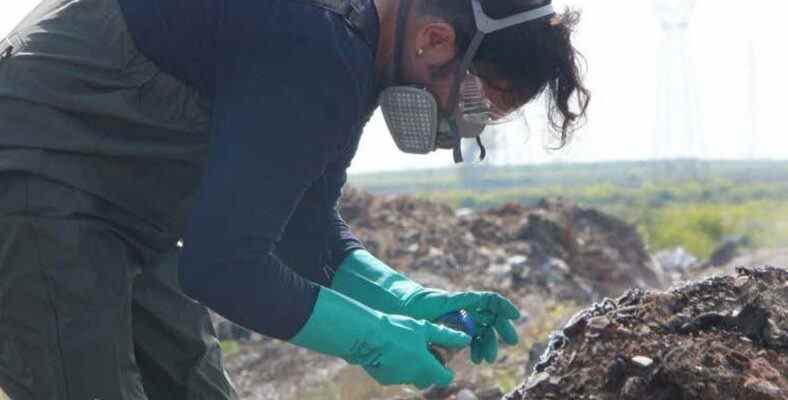The report published yesterday by Greenpeace revealed that plastic wastes imported to Turkey and processed at 5 points in Adana emit poison. Plastic waste has caused the increase of many harmful chemicals in both air, land and water.
According to Greenpeace data, Turkey is the country that imports the most plastic waste from European countries. 241 times the import rate in the last 16 years increased. A striking report was published yesterday about the situation of these wastes in Turkey. Greenpeace released yesterday’sWaste Games‘, he shared the results of the researches carried out in Turkey and the results showed that these wastes in Turkey turned into a poison showed.
The results were revealed by examining the samples taken from 5 different landfills within the provincial borders of Adana, in the light of the research conducted by Greenpeace Akdeniz and Germany in October 2020 and by Greenpeace Akdeniz, England and Germany in April 2021. Soil, ash, water and river bottom sludge samples analyzed at the Greenpeace Research Laboratory have shown that waste plastics are released into the environment. toxic chemicalto earth, ash and river Heavy metals showed that he did.
Areas with plastics are poisonous:
According to the research, a wide range of toxic chemicals were detected in all locations where samples were taken, many of which are known to be produced during the combustion of plastics. In addition, soil and ash samples known to cause serious health problems such as cancer and high levels of chlorinated dioxins and furans, which accumulate in the body and cause serious health problems, were stated. The main findings shared by Greenpeace were as follows:
- A wide range of toxic chemicals were found at all locations, many of which are known to be produced during the combustion of plastics.
- It has been determined that the samples of waste plastic parts taken from Çukurova/Karahan, Seyhan/Kuyumcular and Yuregir/Incirlik landfills and open combustion areas contain a wide range of toxic organic chemicals as well as various metals and metalloids in relatively high concentrations.
- Heavy metals detected in plastic parts and heavy metals detected in soil, ash and river bottom mud showed parallelism. Organic chemical pollutants in soil, ash and riverbed mud were consistent with chemicals produced during the combustion of plastic. In this case, toxic chemicals detected in the analyzed areas caused by plastics spilled on the field and burned in the open. strengthened the possibility.
- Cancer etc. in soil and ash samples. known to cause serious health problems and accumulate in the body and cause serious health problems in the long term. to chlorinated dioxins and furans at high levels found.
- The amounts of dioxin and furan detected in some of the studied locations have not been found so far. One of the highest levels detected in soil in Turkey has been.
- The amount of chlorinated dioxin and furan detected in the investigated locations was approximately approximate in the Yuregir/Incirlik area compared to the uncontaminated control soil samples taken from nearby points. 400,000 times; In the Seyhan/Yenidam area 8000 times higher quantities have been found. The total polychlorinated biphenyl (PCB) concentration in the soil taken from the Yuregir/Incirlik location was determined from the soil sample taken for control purposes. 30,000 times more found.
- In the soil samples taken from Yenidam location, the polycyclic aromatic hydrocarbon (PAH) amounts detected in some other regions of Turkey are localized. 35 times the amount high levels of PAH have been detected.
- Benzo(a)pyrene, which is known to be carcinogenic for humans, was detected at very high levels in all stations compared to the upper limits specified in the Soil Pollution Control Regulation (TKKY). Benzo(a)pyrene concentration was 6 and 3.6 times, respectively, in Çukurova/Karahan-2 (2 separate ash samples) according to TKKY; It was 2.3 and 1.4 times higher, respectively, in Yuregir/Incirlik (2 separate ash samples).
- Except for the Seyhan/Kuyumcular location, some chlorinated benzene compounds (such as hexachlorobenzene) have been detected in all locations, which may impair hemoglobin metabolism, cause skin lesions, and cause liver disease (porphyria cutanea tarda).
- High concentrations of certain metals and metalloids have been found in all areas, including antimony, cadmium, copper, lead, molybdenum, tin, and zinc, all of which are known to be found in various types of plastics. Cadmium and lead may remain in the environment for a long time after they are released and in repeated exposures. toxic metals that can accumulate in the body.
- Although there are differences for each heavy metal and metalloid in some locations, when compared to the control samples, the Jewellers location’s Between 30 and 200 times cadmium and molybdenum; Incirlik location It contains up to 90 times copper, 140 times tin and 500 times antimony. detected.
- Heavy metals such as cadmium and lead detected in this study are important for human and environmental health. is a serious concern.
- Detected organic pollutants also tend to stay in the soil for a long time. These pollutants can directly and indirectly pollute nearby surface water sources and underground water sources by infiltration. These contaminants have the potential to have dangerous effects on flora, fauna, including microorganisms, and humans. Lead has no known safe levels in the blood and is known to cause intellectual disability in people exposed to it. Exposure to lead can cause reduced intelligence in children and can lead to behavioral difficulties and learning problems.
- Chlorinated dioxins and furans (polychlorinated dioxins and furans: PCDD/Fs), heavy metals, polychlorinated biphenyls (PCBs), polycyclic aromatic hydrocarbons (PAHs), some volatile organic compounds and some flame retardants detected in the samples are toxic chemicals. . Scientific studies have shown that it potentially causes diseases and affects the nervous system.
Greenpeace distributes plastic waste to 5 points within the provincial borders of Adana. spilled illegally stressed. You can reach the results and more information specific to the location by clicking this link.
RELATED NEWS
Turkey Becomes the Country Receiving the Most Plastic Waste from Europe
Source :
https://www.greenpeace.org/turkey/raporlar/rapor-atik-oyunlari-geri-donusumsuz-hayatlar/
